
IU_Gram_Essential_1st
.pdf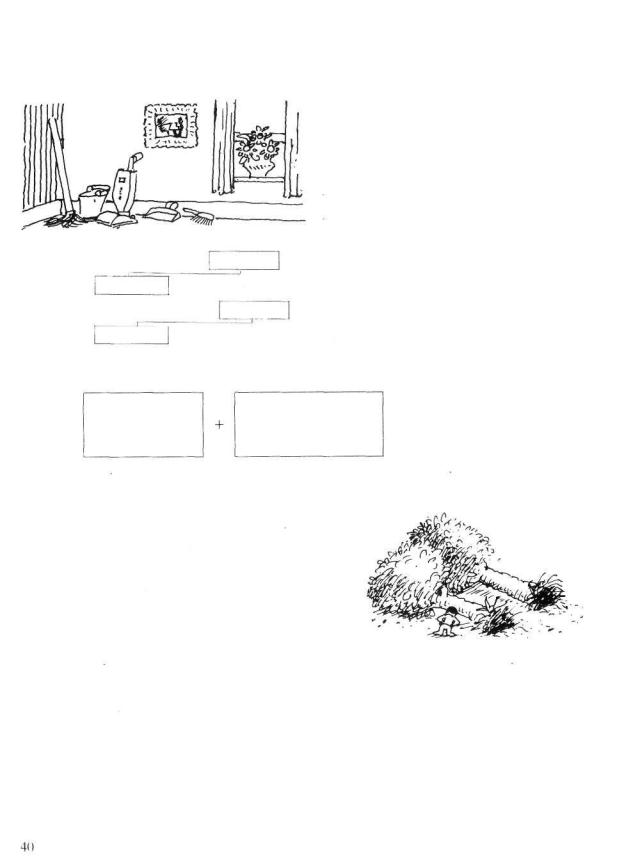
UNIT 20 it is done / it was done (passive)
|
|
|
|
rhc room is cleaned every day. |
|
|
|
|
|
rhe room was cleaned yesterday. |
|
Compare: |
Somebody cleans |
the room |
every day. |
(active) |
|
|
The room is cleaned every day. (passive) |
||||
|
Somebody cleaned |
the room |
yesterday. |
(active) |
|
|
The room was cleaned yesterday, |
(passive) |
|||
• The passive is: |
past participle |
|
|||
|
|
|
|||
present |
am/is/are |
cleaned |
done |
||
|
(not) |
exported |
made |
||
past |
was/were |
damaged |
broken |
||
|
|
|
|
|
|
The past participle of regular verbs is -ed (cleaned/damaged etc.). For a list of irregular past participles (made/seen etc.), see Appendix 1-2.
-Butter is made from milk.
-Oranges are imported into Britain.
-How often are these rooms cleaned?
-I am never invited to parties.
-This house was built 100 years ago.
-These houses were built 100 years ago.
-When was the telephone invented?
-I wasn't invited to the party last week.
- Six people were injured in the |
Two trees were blown down |
accident yesterday. |
in the storm last night. |
•We say was/were born:
-1 was born in London in 1958. (not i am born')
-Where were you born?
•passive + by ... :
-We were woken up by the noise. (= The noise woke us up.)
-The telephone was invented by Alexander Bell in 1876.
-My brother was bitten by a dog last week.

UNIT 20 Exercises
20.1 Write sentences from the words in brackets ( ). All the sentences are present.
1 (this room / clean / every day)
2 (how often / the room / clean?)
3 (glass / make / from sand) Glass
4(stamps / sell / in a post office)
5(football / play / in most countries)
6(this machine / not / use / very often)
7 |
(what language / speak / in Ethiopia?) What |
? |
8 |
(what / this machine / use / for?) |
? |
20.2 Write sentences from the words in brackets ( |
). All the sentences are past. |
|
1 |
(the room / clean / yesterday |
|
2 |
(when / the room / clean?) |
|
3 |
(this room / paint / last month) This room |
|
4(these houses / build / about 50 years ago)
5(Ann's bicycle / steal / last week)
6(three people / injure / in the accident)
7 |
(when / this church / build?) When |
? |
8 |
(when / television / invent?) |
? |
9 |
(how / the window / break?) |
? |
10 (anybody / injure / in the accident?) |
? |
|
11 |
(why / the letter / send / to the wrong address?) |
? |
20.3 Complete the sentences. Use the passive (present or past) of these verbs:
|
|
|
|
damage |
find |
invent |
make |
make |
pay |
|
show |
speak |
steal |
|
|
|
|
|
|
|
|
1 |
The |
r o |
|
r |
y |
day. |
|
|
|
|
2 |
Two |
trees |
|
down in the storm last night. |
|
|
|
|||
3 |
Paper |
|
|
from |
wood. |
|
|
|
|
|
4 |
There was a fire at the hotel last week. Two rooms |
|
|
|
||||||
5 |
Many different languages |
|
|
|
in India. |
|
|
|
||
6 |
These houses are very old. They |
|
about 500 years ago. |
|
||||||
7 |
Many American programmes |
|
|
on British television. |
|
|
||||
8 |
'Is this a very old film?' |
'Yes, |
it |
|
in 1949.' |
|
|
|||
9 |
My car |
|
last week. The next day it |
|
by the police. |
|||||
10 The transistor |
|
|
in 1948. |
|
|
|
|
|||
11 She has a very good job. |
She |
|
|
£3000 a month. |
|
|
||||

UNIT 21 What are you doing tomorrow?
(present for the future)
They are playing tennis now. |
She is playing tennis tomorrow. |
||
• We use am/is/are -ing (present continuous) for something happening now |
Units 3-4): |
||
- |
'Where are George and Sue?' |
'They're playing tennis in the park.' |
|
- |
Please be quiet. I'm working. |
|
|
We also use am/is/are -ing for the future (tomorrow / next week etc.):
-Carol is playing tennis tomorrow.
-I'm not working next week.
I am doing something tomorrow = I have arranged to do something, I have a plan to do
something:
-Alice is going to the dentist on Friday.
(= she has an appointment with the dentist)
-They are going to a concert tomorrow evening, (they have tickets for the concert)
-Are you meeting Bill this evening? (= have you and Bill arranged to meet?)
-What are you doing at the weekend?
-I'm not going out tonight. I'm staying at home.
You can also say 'I'm going to do something' |
Unit 22). |
•Do not use the present simple (I go/do you go? etc.) for arrangements:
-I'm going out this evening, {not 'I go')
-Are you going out tonight? {not 'do you go')
-Ann isn't coming to the party next week, {not 'Ann doesn't come')
But we use the present simple for timetables, programmes, trains etc.:
-The concert starts at 7.30.
-What time does the train leave?
Study the difference:
-I'm going to a concert this evening. The concert starts at 7.30.
I'm going — present continuous: usually for people
The concert starts- present simple: for programmes, trains etc.
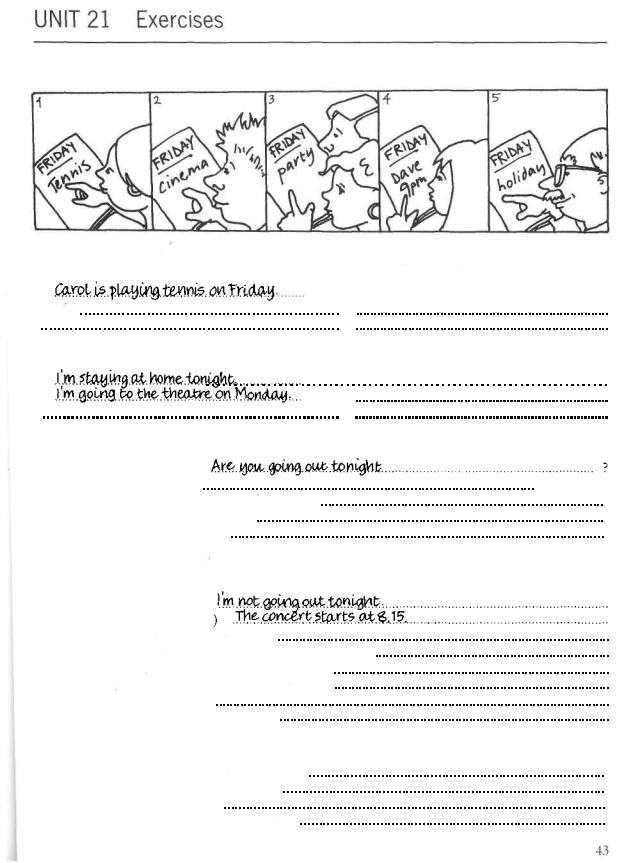
21.1 Look at the pictures. What are these people doing next Friday?
Carol |
Dick |
Tom and Sue |
Barbara |
George |
|
play / tennis |
go / to the cinema |
go / to a party |
meet / Dave |
go / on holiday |
|
1 |
|
|
|
|
|
2 |
Dick |
|
4 |
|
|
3 |
|
|
5 |
|
|
21.2 Write some sentences about yourself. What are you doing in the next few days?
1 |
|
|
2 |
|
5 |
3 |
|
6 |
21.3 Write questions. All the sentences are future, |
|
|
1 |
(you / go / out tonight?) |
|
2 |
(you / work / next week?) |
next week ? |
3 |
(what / you / do / tomorrow evening?) What |
? |
4 |
(what time / Bob and Sue / come?) |
? |
5 |
(when / Liz / go / on holiday?) |
? |
21.4 Use the words in brackets ( ) to write sentences. All the sentences are future. Use the present continuous (he is leaving etc.) or present simple (it leaves etc.).
1 |
(I / not / go out / tonight) |
|
2 |
(the concert / start / at 8.15 |
|
3 |
(I / meet / my friends this evening) I |
|
4 |
(Tom / not / come / to the party on Thursday) Tom |
|
5 |
(The English course / finish / on 10 May) |
The |
6 |
(my sister / get / married next December) |
My |
7(my train / leave / at 8.45)
8(I / not / go / to London tomorrow)
These sentences are questions. All the sentences are future.
9 |
(what time / the train / leave?) What time |
? |
10 |
(what time / you / leave / tomorrow?) |
? |
11 |
(when / they / get married?) |
? |
12 |
(when / the next English course / begin?) |
? |
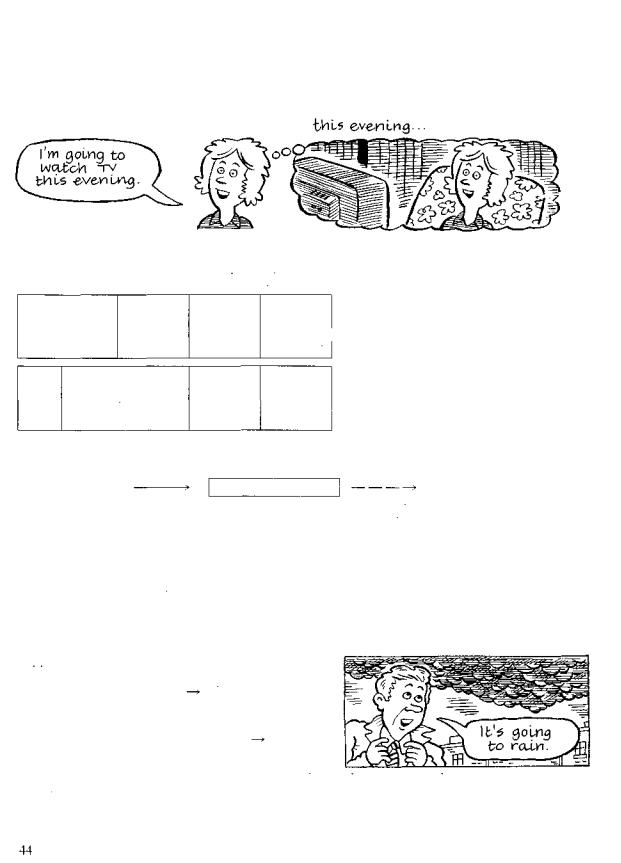
U N I T 2 2 |
I'mgoingto... |
morning . . .
She is going to watch TV this evening.
• We use am/is/are going to . .. for the future:
|
I |
am |
|
do . . . |
|
he/she/it |
is |
(not) going to |
drink . . . |
we/you/they |
are |
|
watch |
|
am |
I |
|
going to |
buy . . . ? |
is |
he/she/if |
|
eat . . . ? |
|
are |
we/you/they |
|
wear . . . ? |
|
I am going to do something = I have decided to do something, my intention is to do something:
I decided to do it |
I'm going to do it |
|
past |
present |
future |
-I'm going to buy some books tomorrow.
-Sarah is going to sell her car.
- |
I'm not going to have breakfast this morning. I'm not hungry. |
- |
What are you going to wear to the party on Saturday? |
- |
'Your hair is dirty.' 'Yes. I know. I'm going to wash it.' |
- |
Are you going to invite John to your party? |
• You can say that something is going to happen when it is clear now that it is sure to happen:
-Look at the sky! It's going to rain.
(black clouds now ram)
ram)
-Oh dear! It's 9 o'clock and I'm not ready.
I'm going to be late.
(9 o'clock now and not ready  late)
late)
I |
We also use the present continuous (I am -ing) for the future, usually tor arrangements |
(• |
Unit 21): |
|
- I am playing tennis with Jack tomorrow. |
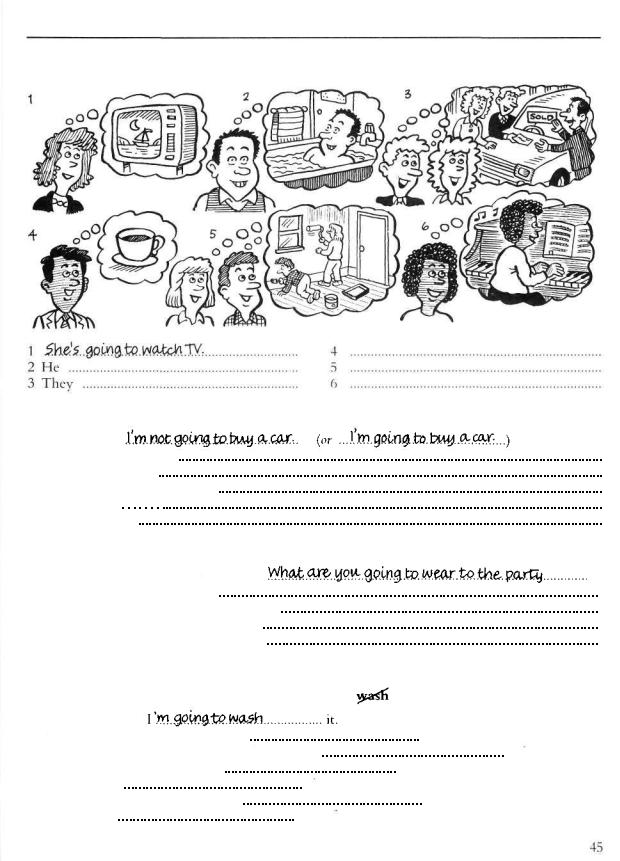
UNIT 22 Exercises
22.1 What are these people going to do?
22.2 Are you going to do these things tomorrow?
1 |
(buy a car) |
|
2 |
(get up before 6.30) |
I |
3 |
(have breakfast) I |
|
4 |
(watch TV in the morning) |
|
5 |
(cook a meal) |
, |
6 |
(ride a bicycle) |
|
22.3 Make questions. Use ... going to ...
1 |
(what / you / wear / to the party?) |
? |
2 |
(when / you / visit me again?) |
? |
3 |
(what time / Tom / phone you tonight?) |
? |
4 |
(how long / your friends / stay here?) |
? |
5 |
(what time / you / get up tomorrow?) |
? |
22.4 Complete the sentences. Use ... going to + one of these verbs:
eat |
give |
lie |
rain |
study |
walk |
|
|
1 My hair is dirty. |
|
|
|
|
|||
2 |
I don't want to go home by bus. I |
|
|
||||
3 |
John's university course begins in October. He |
engineering. |
|||||
4 |
Take an umbrella with you. It |
|
|
|
|||
5 |
I'm hungry. I |
|
|
|
this sandwich. |
||
6 |
It's Val's birthday next week. We |
|
her a present. |
||||
7 |
I feel tired. I |
|
|
|
down |
tor an hour. |
|

UNIT 23 will/shall (1)
Bill is 24 years old now.
Last year he was 23.
Next year he will be 25.
• will + infinitive |
(will be / will win / will come etc.): |
|
|
|||
positive and negative |
|
|
question |
|
|
|
|
|
be |
|
|
be? |
|
I/we/you/they |
will ('ll) |
win |
will |
I/we/you/they |
win? |
|
he/she/it |
will not (won't) |
come |
he/she/it |
come? |
||
|
||||||
|
|
eat |
|
|
eat? |
|
will = 'll: I'll (= I will) / you'll / she'll etc.
will not = won't: I won't (= I will not) / you won't / it won't etc.
•We use will for the future (tomorrow / next week etc.):
-She travels a lot. Today she is in London. Tomorrow she'll be in Rome. Next week she'll be in Tokyo.
-Telephone me this evening. I'll be at home.
-Leave the old bread in the garden. The birds will eat it.
-We'll probably go out this evening.
-Will you be at home this evening?
-I won't be here tomorrow. (= I will not be here)
-Don't drink coffee before you go to bed. You won't sleep.
We often say I think . . . w i l l . . . :
-I think Diana will pass the exam.
-I don't think it will rain this afternoon.
-Do you think the examination will be difficult?
But do not use will for things you have already arranged to do or decided to do (• Units 21-2):
-We're going to the theatre on Saturday, (not 'we will go')
-Are you working tomorrow? (not 'will you work')
•shall
You can say I shall (= I will) and we shall (= we will):
- |
I shall be late tomorrow, |
or |
I will (I'll) be late tomorrow. |
- |
I think we shall win. |
or |
I think we will (we'll) win. |
But don't use shall with you/they/he/she/it. (not 'he shall be late')
• Unit 24 will/shall (2)

is going on a European tour next month. Look at her plans. Where will she be on these
She
e will you be? Write sentences about yourself. Use I'll be ... / I'll probably be ... /1 don't e I'll be.
r from now) |
I |
|
|
ight) |
|
|
|
ock tomorrow |
afternoon) |
|
|
rs from now) |
|
|
|
the negative. |
|
|
|
|
|
3 |
it will happen |
I |
|
4 |
You'll find it |
sentences with I think ... All the sentences are future. |
|||
pass the exam) |
|
||
in the game) |
I think |
|
|
e her present) |
|
|
|
her / be nice tomorrow) |
|
||
sentences with I don't think ... |
|
||
t married) |
I don't |
|
|
nome this evening) |
|
||
'bs in these sentences are underlined. Which are right? Study Unit 21 before you do this
We are going to the theatre tonight. We've got the tickets,
oing is right.) |
|
1 you do / are you doing tomorrow evening?' |
'Nothing. I'm free.' |
m going away tomorrow morning. My train is at 8.40. |
|
e´ll lend / he's lending you some money. He's very rich, |
|
you putting on your coat?' Til go out / I'm |
going out.' |
link Claire will phone / is phoning us tonight? mieet us on Saturday. She'll work / She's working.
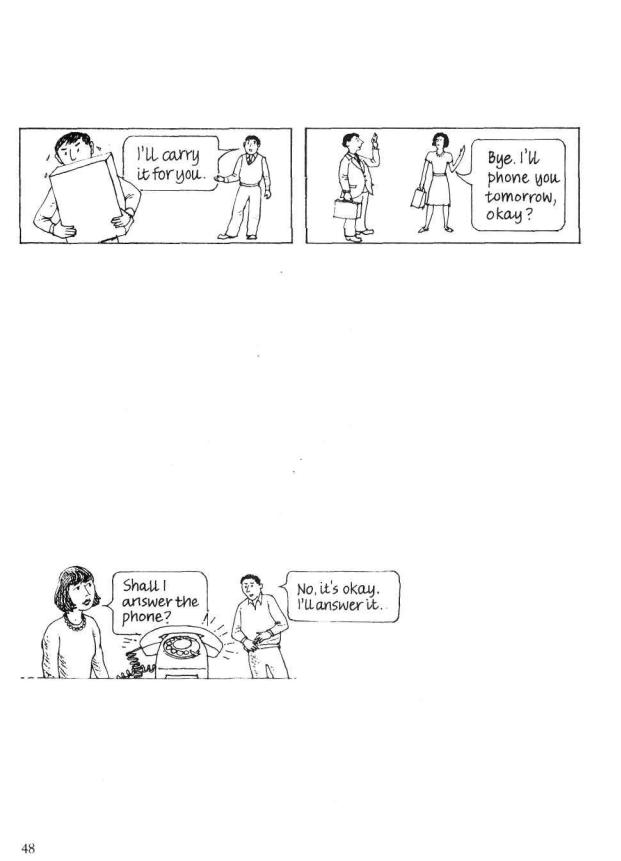
UNIT 24 will/shall (2)
• Unit 23 will/shall (1)
• You can use I'll . . . (= I will) when you offer or decide to do something:
- |
'My case is very heavy.' 'I'll carry it for you.' |
- |
'I'll phone you tomorrow, okay?' 'Okay, goodbye.' |
We often say I think I'll/I don't think I ' l l . . . when we decide to do something:
-I'm tired. I think I'll go to bed early tonight.
-It's a nice day. I think I'll sit in the garden.
-It's raining. I don't think I'll go out.
Don't use the present simple (I go/I phone etc.) in sentences like these:
-I'll phone you tomorrow, okay? (not 'I phone you')
-I think I'll go to bed early, (not 'I go to bed')
Don't use I ' l l . . . |
for something you decided before (• Units 21-2): |
-I'm working tomorrow, (not 'I'll work')
-I'm going to watch TV tonight, (not 'I'll watch')
-What are you doing at the weekend? (not 'what will you do')
•Shall I . . . ? / Shall we . . . ?
Shall I / Shall we . . . ? = Do you think this is a good thing to do? Do you think this is a good idea?
- It's warm in this room. Shall I open the window? |
|
|
- |
'Shall I phone you this evening?' 'Yes, please.' |
|
- I'm going to a party tonight. What shall I wear? |
|
|
- It's a nice day. Shall we go for a walk? |
|
|
- |
Where shall we go for our holidays this year? |
|
- |
'Let's go out this evening.' 'Okay, what time shall we meet?' |
(Let's • Unit 48) |
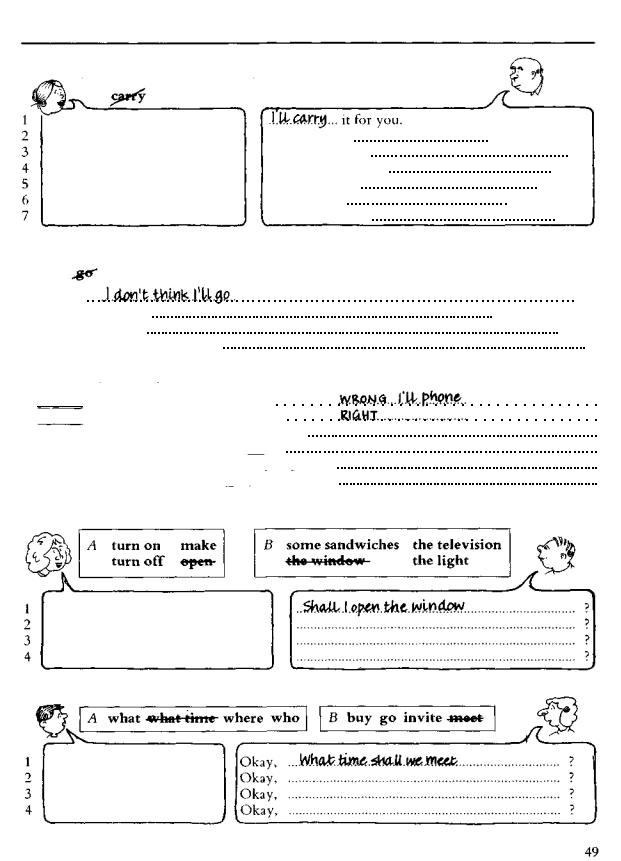
UNIT 24 Exercises
24.1 Complete the sentences. Use I will (I'll) + one of these verbs:
do eat
My case is very heavy. Enjoy your holiday.
I don't want this banana. Are you coming with me?
Did you phone Jack? Do you want a chair?
How do you use this camera?
send |
show |
sit |
stay |
Thank you. I |
|
you a postcard. |
|
Well, |
I'm hungry |
|
it. |
No, I don't think so |
here. |
||
Oh no, I forgot |
|
it now. |
|
No, it's okay |
|
on the floor. |
|
Give it to me and |
|
you. |
|
24.2 Complete the sentences. Use I think I'll... or I don't think I'll... + one of these verbs:
buy |
have |
play |
|
|
1 |
It's cold. |
|
|
out. |
2 |
I'm hungry. I think |
|
something to eat. |
|
3 |
I feel tired. I don't |
|
tennis. |
|
4 |
This camera is too expensive. I |
it. |
||
24.3 Are the underlined words right or wrong? Correct the sentences that are wrong.
1 I phone you tomorrow morning, okay?
2I phone my sister every Friday.
3I haven't done the shopping yet. I do it later.
4 |
'I don't want to drive.' 'Okay, I drive.' |
5 |
'How do you usually go to work?' 'I drive.' |
6 |
'I haven't got any money.' 'I lend you some.' |
24.4 Write sentences with Shall I... ? Choose words from box A and box B.
It's warm in this room.
This programme isn't very good.
I'm hungry.
It's dark in this room.
24.5 Write sentences with Shall we ... ? Choose words from box A and box B.
Let's go out tonight.
Let's have a holiday.
Let's spend some money.
Let's have a party.
